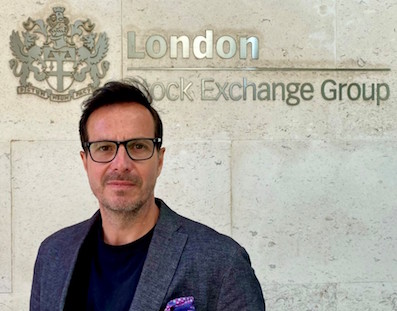 Cleanzine: your weekly cleaning and hygiene industry newsletter 10th July 2025 Issue no. 1170
Cleanzine: your weekly cleaning and hygiene industry newsletter 10th July 2025 Issue no. 1170
Your industry news - first
The original and best - for over 20 years!
We strongly recommend viewing Cleanzine full size in your web browser. Click our masthead above to visit our website version.
Post Covid-19 crisis can lead to a new period of rapid growth and prosperity
 Simon Sear, CEO and founder of Studio 44, the consultancy that helps senior business leaders create step-out growth, disrupt markets and transform their culture and ways of working, writes…
Simon Sear, CEO and founder of Studio 44, the consultancy that helps senior business leaders create step-out growth, disrupt markets and transform their culture and ways of working, writes…
* Transformative change: Environmental, social and technological trends are converging, leading to rapid, disruptive and transformative change. Leaders need to be ready to act
* COVID legacy: Organisations can harness innovative approaches taken during the pandemic to meet the challenges ahead, from experimentation in working practices to shifts in mindset
* Tipping point: Society has reached a tipping point on an appetite for environmental sustainability, while new technologies are also supercharging the pace of change.
“As we recover from the pandemic, environmental, social and technological trends are converging, leading to rapid, disruptive and transformative change, the likes of which we have not experienced for more than a generation. Leaders need to ensure that they and their organisations are ready to innovate and transform.
"The Covid crisis will lead to a new period of rapid, transformative growth and prosperity just like the First World War led to the roaring twenties, the Second World War to the golden age of capitalism and the recession of the late 1970s to the expansive growth of the 1980s. Spring always follows Winter.
Combining with this natural economic cycle are major tailwinds, such as society's demand for more progress on racial and gender equality, social mobility and mental wellbeing. Governments and wider society have reached a tipping point on progress with environmental sustainability, while technologies including artificial intelligence (AI), hyper-automation and the Internet of Things (IoT) are supercharging change.
These converging trends will result in rapid, disruptive and transformative change, the likes of which we have not experienced for more than a generation.
Economists are predicting record growth and leaders need to ensure that their organisations are bold, more agile and quicker to change than at any time in history in order to deliver competitive performance in terms of cost efficiency, revenues and return on capital.
Studio 44 has identified 10 key insights by working with leaders during the challenging times of Covid, ranging from experimentation to mindset, technology to organisational culture.
The crisis has highlighted many insights into how leaders can prepare for this next phase of growth and the journey ahead. They are at a once in a generation inflection point, opportunity is coming, and they need to ensure that they and their organisation are ready to innovate and transform.
Here is a summary of Studio 44's top 10 insights:
1. Create a common mission: Often, in non-crisis times, organisations pay lipservice to their mission. It's written down, but no one really buys it. If the crisis did one thing very well, it was to provide a focus.
2. The need for speed: The pace of change had been increasing, but the crisis supercharged this. Leaders need to focus their organisations on being able to respond quicker and with more agility than ever before.
3. Change the corporate mindset: Many companies have long-held beliefs that limited their ability to respond and transform assumptions that need to be put in the bin.
4. Make bold investments: The successful businesses of the last 12 months were the ones that had historically invested in new ways of working and bold new propositions.
5. Experiment: In a decade that will be defined by rapid change and transformation, inexpensive, fast experimentation needs to be in the DNA of an organisation.
6. Allocate your best people to your best opportunities: The pace of change is becoming ever faster and the war for talent continues to heat up. Leaders need to balance the need for transparency and fairness with quickly getting the right people in the right roles to optimise the chances of an organisation's success.
7. Teach more than new digital skills: In building on the successes of working from home and a period of change and disruption, it's crucial to teach employees new cognitive strategies and behaviours to enable them to adapt.
8. Break the silos: During the Covid crisis innovative leaders gathered a multi-skilled team, incentivised them all for success in the same way and gave them the space to make it happen. Many leaders are now thinking about how they can maintain this kind of operating model and not return to older ways of working and the inefficiencies they create.
9. Keep communicating
The pace of disruption and uncertainty in the next decade means that people will often feel unsettled and will seek reassurance. These are the same needs team members faced during the Covid crisis.
10. Practice stakeholder capitalism
Leaders need to take a cooperative model into the next period of transformation. They need to take a long-term view, to have a strategy that not only ensures financial performance in the short term, but invests, and is seen to invest, in longer-term positive outcomes for all stakeholders.”
For more than 25 years, Simon Sear has helped people at companies such as Fidelity Investments, BP, Anglo American and Deutsche Bank, deliver significant new value through technology-enabled transformation and innovation. He was an international Chief Information Officer and published author before the age of 30 and spent the following decade as a global IT leader at BP, before moving into consultancy.
20th May 2021







